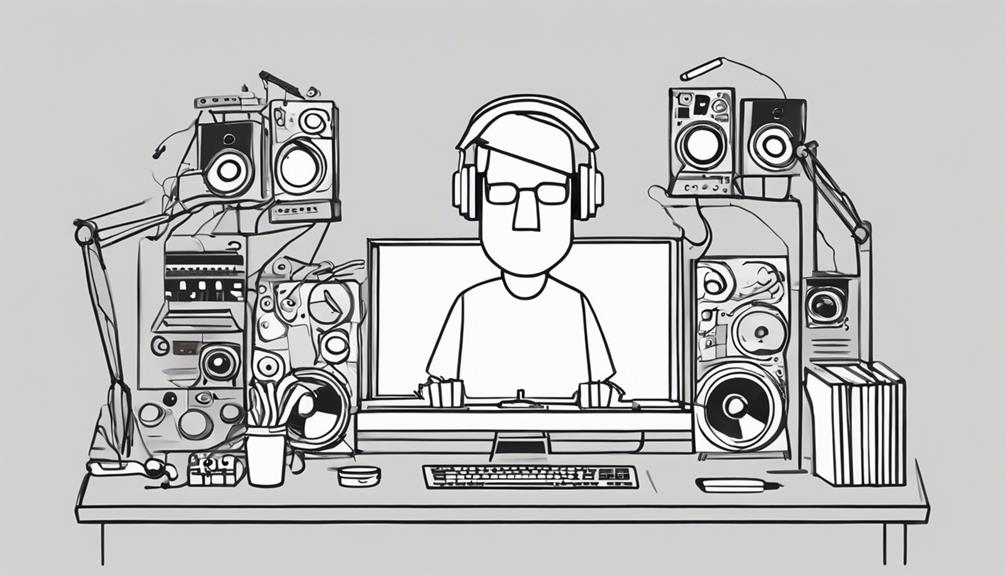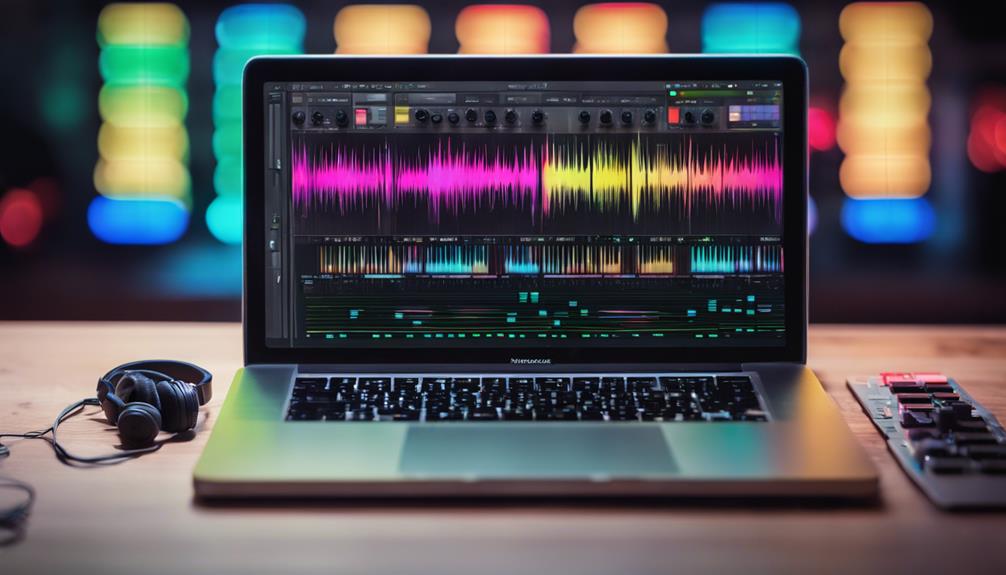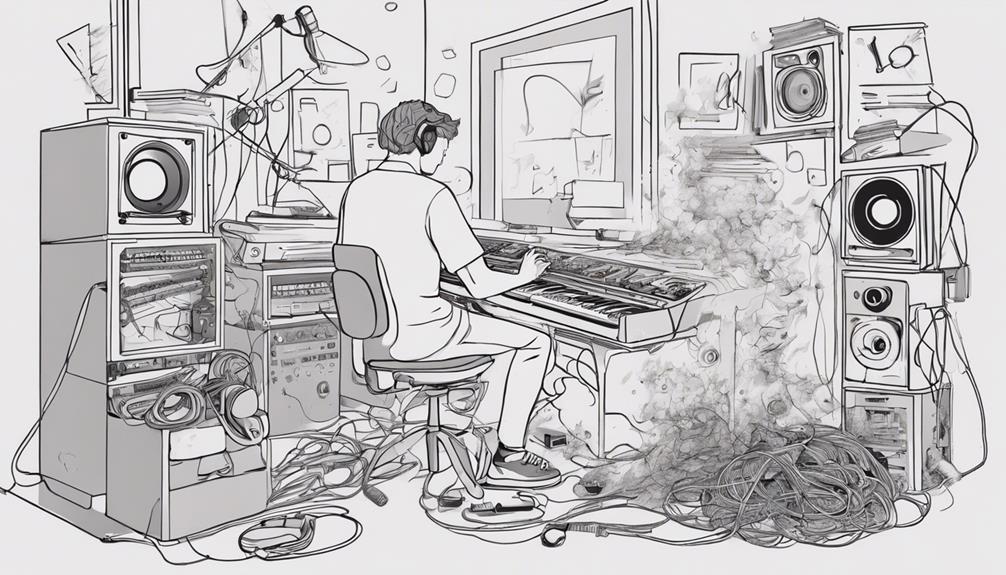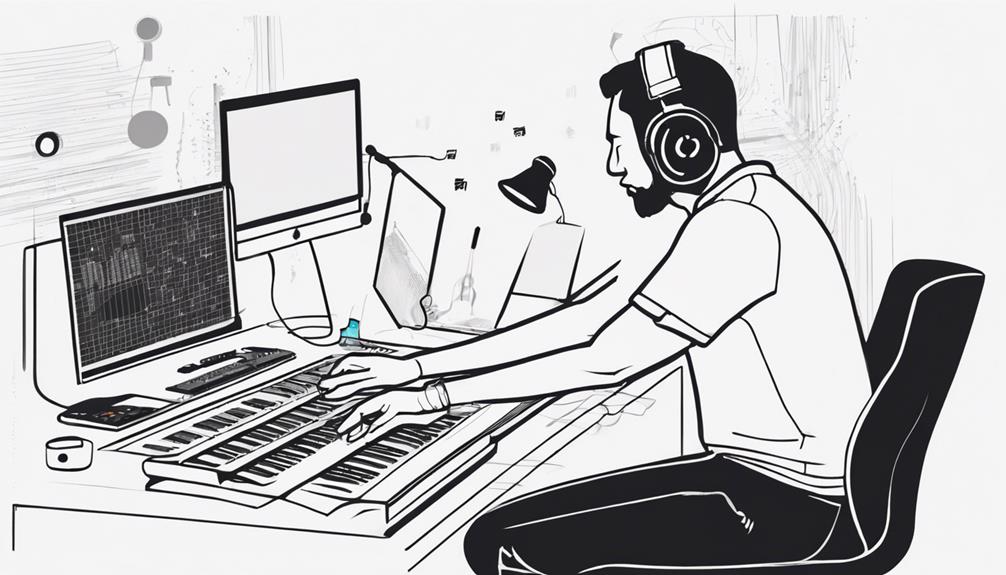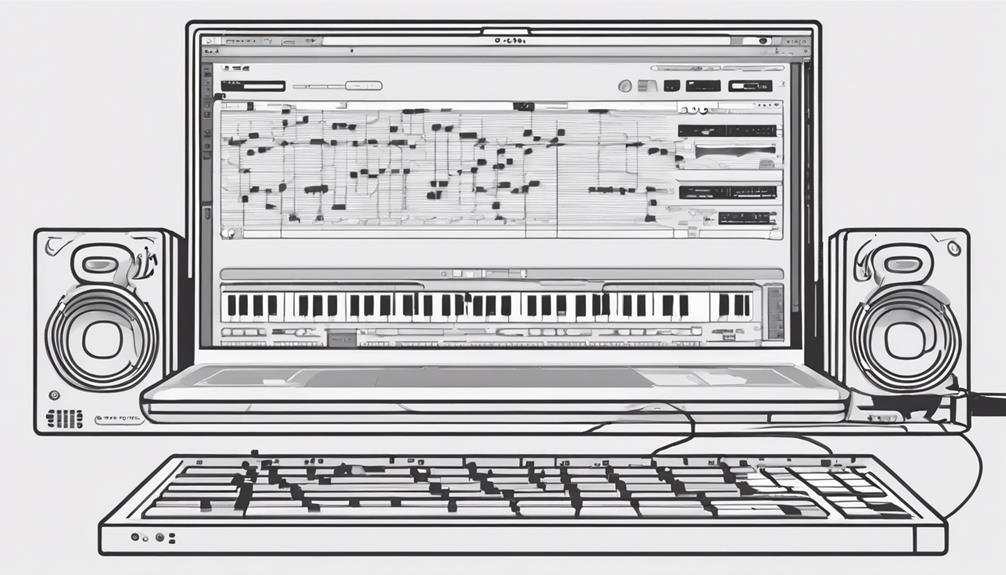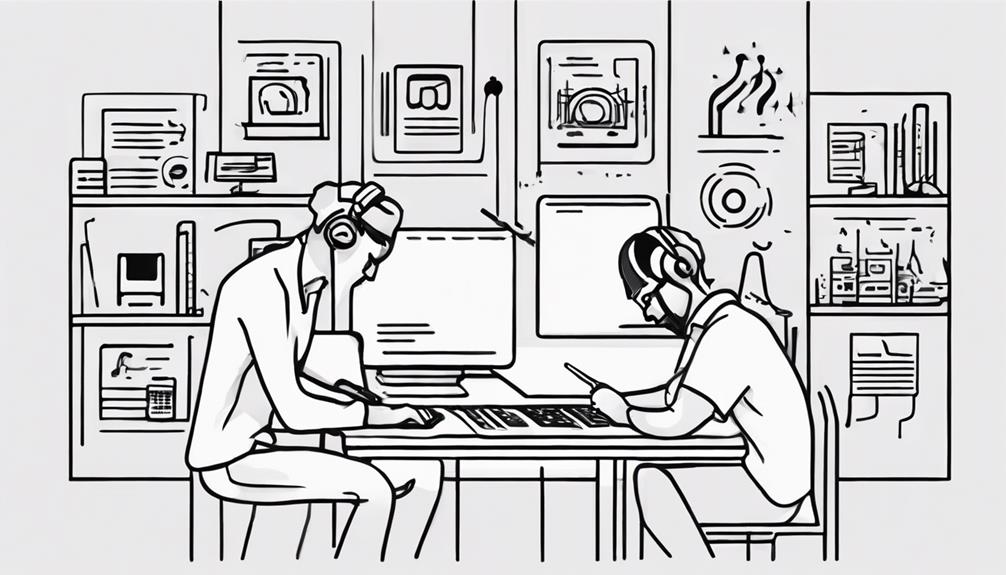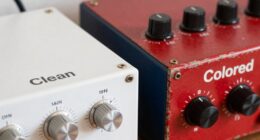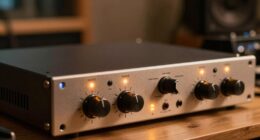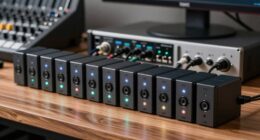To become skilled in music production, invest in essential gear like audio interfaces and MIDI keyboards for quality output. Pay attention to room acoustics; use panels and bass traps for best sound. Choose the right DAW that aligns with your needs and goals, such as Ableton Live or FL Studio. Focus on listening over visuals, analyze reference tracks, and develop music theory skills to craft engaging compositions. Enhance chord progressions for rich melodies, and practice regularly to refine your skills. Seeking feedback and implementing practical tips will further boost your music production expertise.
Key Takeaways
- Invest in essential gear like an audio interface and MIDI keyboard for quality production.
- Learn music theory for composing engaging melodies and harmonically rich progressions.
- Utilize reference tracks to analyze industry standards and improve mixing techniques.
- Practice chord progressions and scales to enhance creativity and musical vocabulary.
- Develop communication skills for effective collaboration with industry professionals.
Invest in Essential Gear
Invest in essential gear to set yourself up for success in music production.
A 2 in/2 out audio interface is essential for quality sound input and output. This piece of equipment allows you to connect microphones and instruments to your computer, ensuring pristine audio recordings.
Consider adding a 25-key MIDI keyboard to your setup. This compact keyboard is perfect for composing melodies and chords efficiently, offering a tactile feel that enhances your creative process.
Additionally, studio monitors are indispensable for accurate sound reproduction. These specialized speakers provide a flat frequency response, allowing you to hear your music as it truly sounds without coloration.
Investing in these key pieces of gear will elevate your music production experience, enabling you to create professional-quality tracks with precision and clarity.
Focus on Room Acoustics
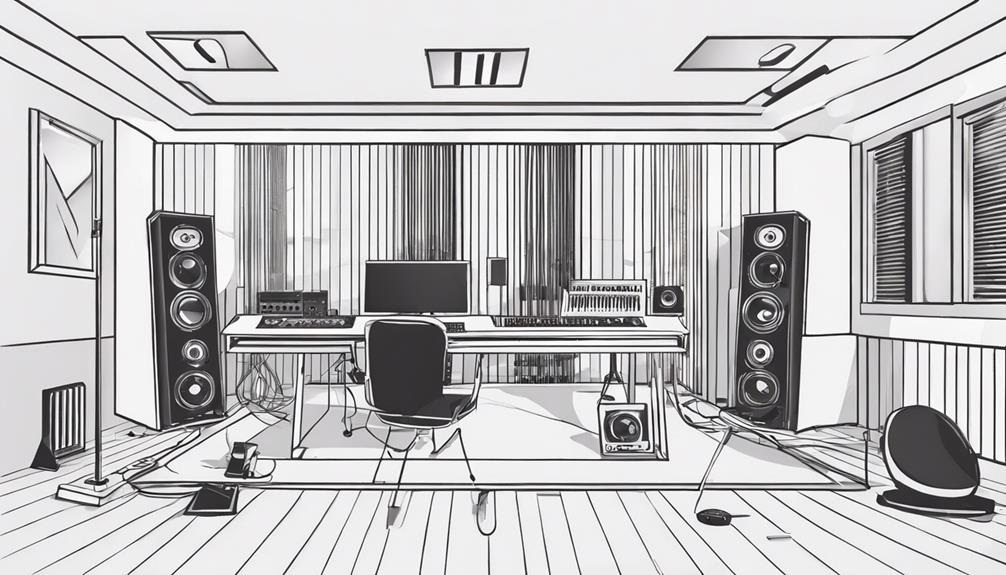
When it comes to music production, your room acoustics play an essential role in shaping the sound you create.
Understanding how room size impacts sound, the importance of acoustic treatment, and proper monitor placement can greatly enhance your music production workflow.
Room Size Matters
Room acoustics play a pivotal role in music production, particularly influenced by the size of the room. When it comes to room size, smaller spaces can lead to more pronounced reflections and standing waves, affecting sound quality.
On the other hand, larger rooms generally offer better acoustics as they allow sound to disperse more naturally. To optimize room acoustics, consider incorporating acoustic panels, bass traps, and diffusers strategically. These tools can help minimize unwanted reflections and standing waves, creating a more balanced sound environment for your music production endeavors.
When setting up your music production space, take into account factors such as room dimensions, ceiling height, and wall materials to further enhance acoustics. By paying attention to room size and acoustics, you can meaningfully improve the accuracy of sound monitoring and elevate the overall quality of your music production work.
Acoustic Treatment Importance
Enhancing room acoustics through proper acoustic treatment is essential for optimizing sound quality in music production.
When focusing on room acoustics, consider the following key points:
- Room Acoustics Impact Sound Quality: Room acoustics contribute greatly to the overall sound quality in music production, accounting for 60% of the final result.
- Types of Acoustic Treatment: Acoustic treatment involves the strategic placement of panels, cloud panels, and diffusers to control reverberation and create a balanced sound environment.
- Avoid Over-Treating: While acoustic treatment is important, over-treating a room can lead to a sterile sound that lacks warmth and character. Finding the right balance is essential.
- Sound Conditions: Proper room treatment is vital for creating ideal sound conditions that allow for accurate mixing, mastering, and overall music production quality improvement.
Investing in acoustic treatment can greatly enhance the final output of your music projects.
Monitor Placement Tips
To enhance sound quality in your music production environment, it is crucial to pay attention to proper monitor placement, particularly focusing on room acoustics. Ensuring that your monitors are correctly placed can significantly impact the accuracy of sound reproduction, allowing you to create and mix music more effectively. Placing your monitors at ear level in an equilateral triangle with your head can help maintain a balanced soundstage, enhancing your listening experience.
Consider the following monitor placement tips:
| Monitor Placement Tips |
|---|
| Place monitors at ear level |
| Position monitors in an equilateral triangle with your head |
| Keep monitors away from walls and corners |
| Utilize acoustic treatment like bass traps, diffusers, and absorbers |
| Regularly check and adjust monitor placement for the best sound quality |
Choose the Right DAW
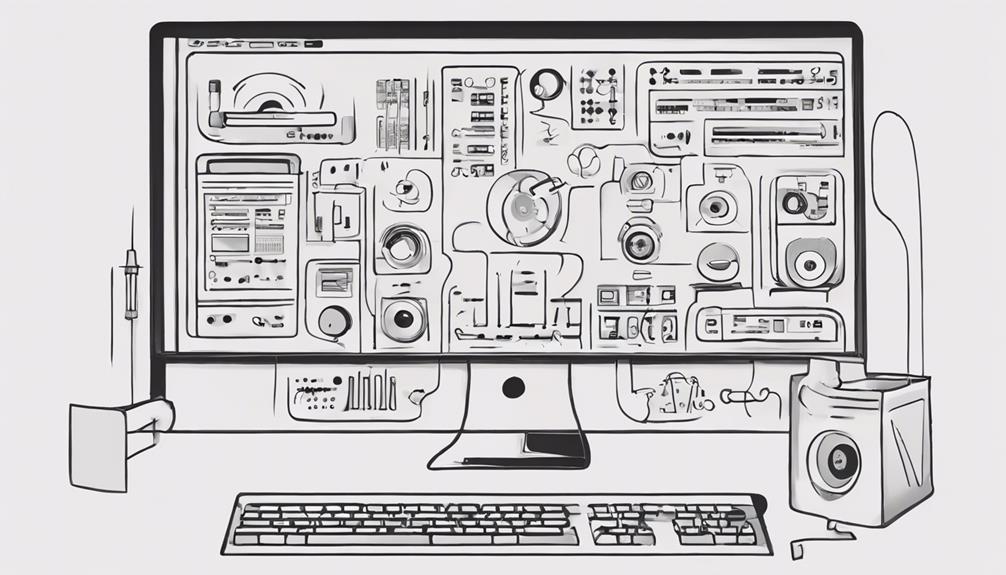
Consider selecting the right DAW for your music production journey based on your preferred workflow, features, and operating system compatibility. Here are some key points to help you choose the right DAW:
- Explore Options: Look into popular DAWs like Ableton Live, FL Studio, Logic Pro, Pro Tools, and Studio One to see which aligns best with your needs.
- Evaluate Features: Consider the learning curve, available plugins, virtual instruments, and community support offered by each DAW to make sure it fits your production style.
- Trial Versions: Take advantage of free trials that many DAWs offer to test them out before committing to a purchase. This hands-on experience will give you a feel for the workflow and features.
- Goal Alignment: Choose a DAW that not only suits your current needs but also supports your long-term music production goals. It should inspire creativity and enhance productivity in your production process.
Prioritize Listening Over Visuals
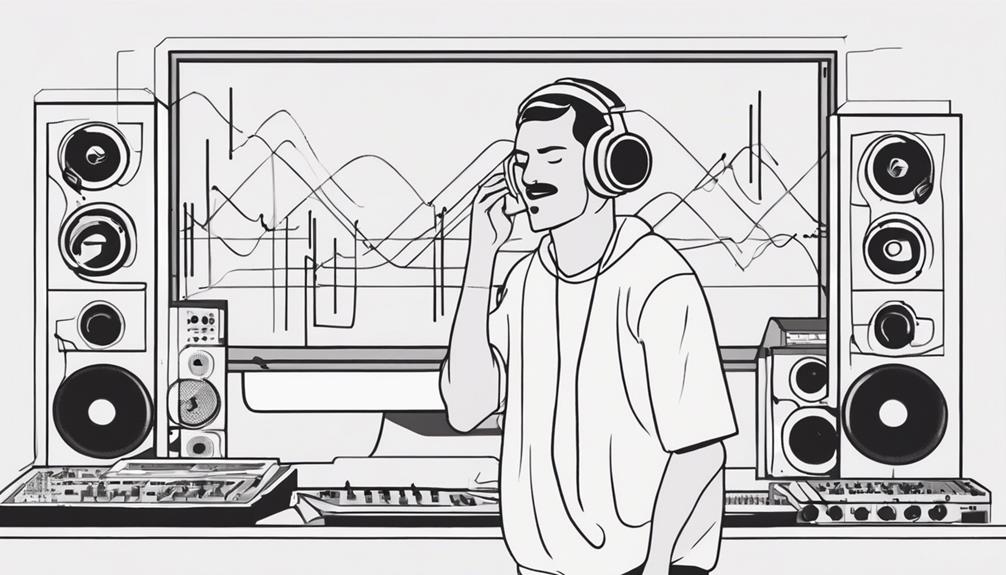
Prioritizing listening over visuals is essential in music production to train your ears effectively and make informed decisions based on sound quality and balance.
While visual aids can be helpful, they should complement rather than overshadow your reliance on auditory perception.
Closing your eyes during critical listening sessions can heighten your focus on the nuances of sound and enhance your ability to make precise adjustments in your music.
By emphasizing auditory perception over visual cues, you guarantee that your production decisions are rooted in the most vital sense for music creation.
Developing a sharp sense of hearing through active listening is imperative for refining your skills and crafting high-quality music.
Use Reference Tracks
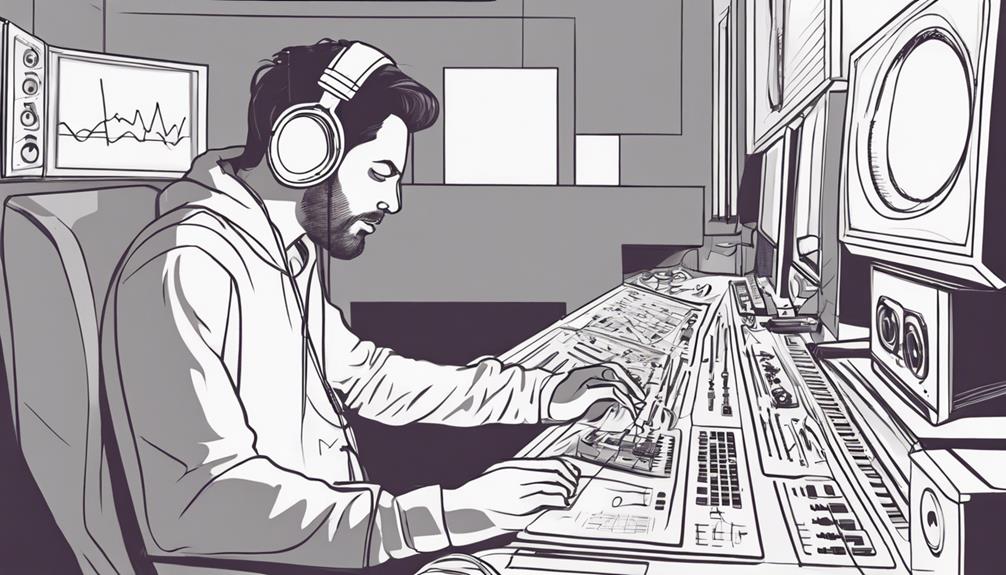
Utilizing reference tracks in music production aids in analyzing industry-standard music for genre-specific elements and techniques. These tracks serve as a valuable tool to enhance your skills and elevate the quality of your music production.
Here's how you can effectively use reference tracks:
- Guidelines for Style Injection: Reference tracks provide a roadmap for injecting your unique style into your music while still adhering to industry standards.
- Enhanced Understanding: Studying reference tracks can deepen your knowledge of mixing, mastering, and production techniques, helping you refine your craft.
- Identifying Areas for Improvement: By comparing your work to reference tracks, you can pinpoint areas that need improvement and make necessary adjustments to achieve a polished sound.
- Professional Practice: Utilizing reference tracks is a common practice among professional music producers to ensure the production of high-quality music that meets industry standards.
Develop Music Theory Skills

To enhance your music production skills, start by learning basic music theory concepts like scales, chords, and progressions.
Practice creating chord progressions and familiarize yourself with different scales and modes to expand your musical vocabulary.
Understanding these fundamental elements will empower you to craft more compelling and sophisticated compositions.
Learn Basic Theory
Enhancing your music production skills starts with developing a solid understanding of basic music theory. By grasping the fundamental concepts of music theory, you lay a strong foundation for your creative endeavors in music production.
Here's why learning basic theory is essential:
- Composing Melodies: Understanding music theory allows you to create engaging melodies that resonate with listeners, utilizing scales and intervals effectively.
- Chord Progressions: Basic theory knowledge empowers you to construct harmonically rich chord progressions that evoke different emotions and enhance the overall mood of your tracks.
- Musical Arrangements: With a grasp of music theory, you can craft cohesive musical arrangements by structuring different sections of a song logically and harmoniously.
- Communication and Decision-making: Developing music theory skills not only enhances your ability to communicate with other musicians and producers but also enables you to make informed musical decisions based on scales, chords, and key signatures.
Mastering basic music theory is a vital step towards becoming proficient in music production.
Practice Chord Progressions
Practice different chord progressions to strengthen your understanding of music theory and enhance your composition skills. By practicing various chord progressions, you can grasp the fundamental building blocks of music and how different chords work together harmoniously.
Learning common chord progressions across different music genres won't only broaden your musical vocabulary but also provide you with a solid foundation for creating your own unique compositions.
Experimenting with crafting your own chord progressions is key to developing your musical style and creativity. Understanding the emotional impact of different chord progressions will allow you to convey specific moods and feelings in your music effectively.
To deepen your knowledge and skills in this area, consider utilizing tools such as chord progression generators or referring to music theory books for further exploration.
Study Scales and Modes
Studying scales and modes is vital for developing a strong foundation in music theory and enhancing your music production skills. Understanding these fundamental elements won't only improve your overall musical knowledge but also make a significant difference in how your music sounds. Here are some essential tips to help you make the most out of your time studying scales and modes:
- Learn the major and minor scales: These are the building blocks of music theory and will provide you with a solid framework for creating melodies and harmonies.
- Familiarize yourself with different modes: Modes like Ionian, Dorian, and Mixolydian offer unique tonalities that can add depth and complexity to your music.
- Practice identifying and playing scales and modes: Whether on your instrument or in your DAW, hands-on practice is important for mastering these concepts.
- Experiment with different scales and modes: This experimentation will help you discover new sounds and improve your music's overall sound design.
Practice Regularly
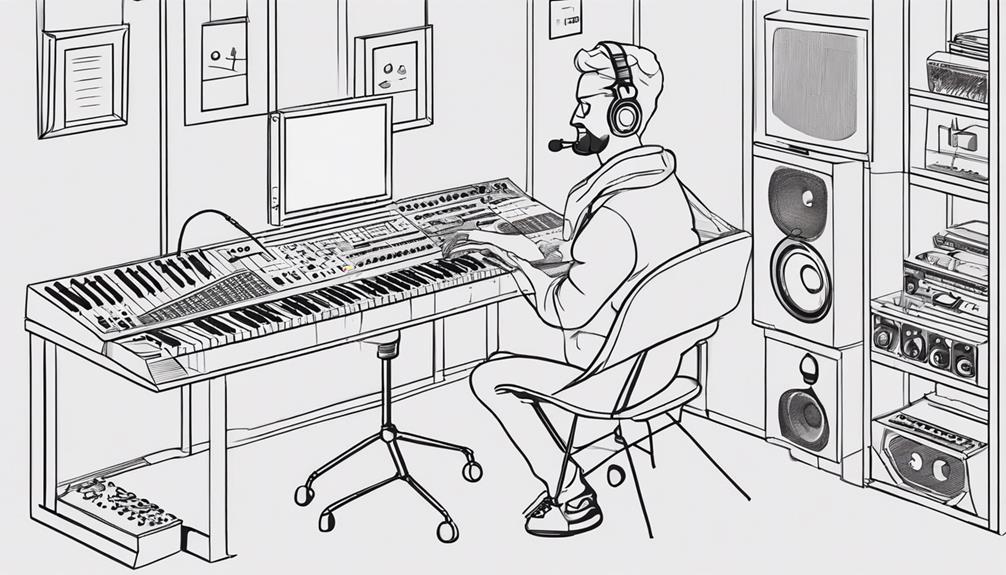
Consistent practice is essential for honing your skills in music production and fostering creativity. By practicing regularly, you not only enhance your technical skills but also nurture your creativity, allowing you to explore new ideas and approaches.
Engaging in consistent practice sessions enables you to experiment with different techniques, sounds, and workflows, refining your abilities over time.
Setting aside dedicated time for practice each day or week is vital for your progression in music production. This routine helps in building muscle memory for using tools, software, and equipment efficiently, ultimately improving your overall proficiency.
The more you practice, the more comfortable and confident you become in expressing your musical ideas and vision. Remember, practice is key to developing a strong foundation in music production and reaching your full potential as a producer.
Seek Feedback

To refine your music production skills further, solicit feedback from peers, mentors, and online communities to gain valuable insights. Constructive criticism is invaluable in helping you identify areas for improvement and refine your techniques in music production. Here are some essential tips to make the most out of feedback:
- Seek Diverse Perspectives:
Gather feedback from a variety of sources to gain different viewpoints and insights into your work.
- Actively Listen:
Pay attention to the feedback provided by your peers and mentors, as this can offer valuable suggestions for improvement.
- Implement Suggestions:
Be open to making changes based on feedback received to enhance your music production skills effectively.
- Ask for Specific Feedback:
Request detailed feedback on particular aspects of your work to target areas that need improvement accurately.
Implement Practical Tips
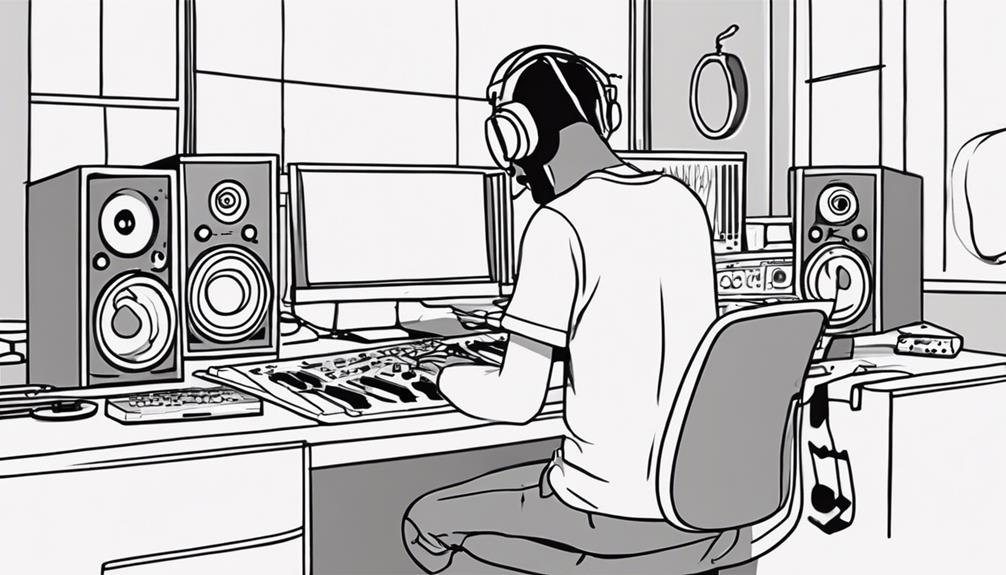
Consider incorporating practical tips to enhance your music production skills effectively. As music producers, mastering mixing techniques can have a substantial impact on the quality of your tracks. Adjust instrument volumes with precision using EQ and control placement within the mix by experimenting with reverb.
Utilizing advanced tools like Neutron 4 can elevate your production process. Take advantage of features such as AI assistive technology, the Audiolens referencing app, and powerful plug-ins to refine your sound.
Neutron Elements, with its affordable mix tools, stereo width enhancement, and individual track adjustments, can also be a valuable asset in your toolkit.
When it comes to finishing work, focus on recognizing when a track is release-ready. Avoid getting caught up in perfectionism and instead work with intention to complete your projects. Additionally, optimize your workflow by creating custom DAW templates, organizing workspaces efficiently, using MIDI controllers, and grasping sound design basics.
Frequently Asked Questions
How to Actually Get Better at Music Production?
To get better at music production, immerse yourself in practice, experiment freely, and trust your instincts. Learn music theory to deepen your understanding. Use modern tools and seek feedback for growth. Your dedication will fuel improvement.
How Can I Be a Good Music Producer?
To be a good music producer, dive deep into music theory, practice consistently, use high-quality tools, seek feedback, and stay inspired. These steps will help you hone your craft, refine your skills, and create amazing tracks.
How Do I Teach Myself Music Production?
Teach yourself music production by familiarizing with DAWs like Logic Pro or FL Studio. Use online resources for tutorials and forums. Experiment with software instruments and effects. Practice creating music, seek feedback, and join online communities for growth.
How Many Hours Does It Take to Become a Good Music Producer?
Becoming a good music producer is like mastering a craft—it takes time. Spend at least 20 hours weekly honing your skills. Diligent practice over several years is essential. Consistency in your efforts is key. Developing your own unique sound and staying up to date with evolving trends in the music industry are essential steps on the journey. Seek out the best music producer tips from seasoned professionals, as their insights can accelerate your learning process. Remember, collaboration with other artists and producers can also help you grow and expand your creative horizons.
Conclusion
So, keep pushing yourself, keep learning, and keep creating.
Like a symphony conductor leading an orchestra, you have the power to shape your sound and create something truly magical.
Embrace the process, trust your instincts, and never stop refining your craft.
With dedication and perseverance, you'll soon find yourself on the path to becoming a master of music production.
Keep the beat alive and let your creativity soar!

